 Harrison, MI
Harrison, MIOvercast, 68°
Wind: 13.8 mph, S
 Harrison, MI
Harrison, MI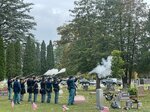
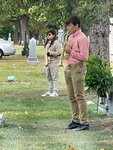
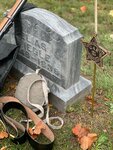
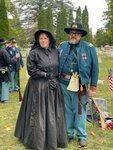
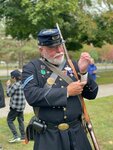
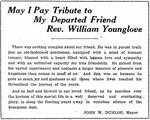
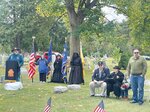
Despite the cooler temperatures and windy fall weather, about 35 citizens joined the Sons of Veterans of the Civil War, General Orlando M. Poe Camp 444 in a ceremony Saturday at Cherry Grove Cemetery. The ceremony honored the last two Civil War veterans of Clare County Reverand William N. Younglove and Elias Reigle. They passed away just one day apart in January 1939. Due to the close death dates both veterans were honored. Both are buried in Cherry Gove Cemetery.
While the Sons of the Civil War are not Civil War reenactors their Honor Guard is dressed in Union Engineer and Infantry uniforms and their gun salute is carried out by firing three times with reproduction Civil War era rifles.
David Smith, commander of Camp 444 also in period dress, gave a synopsis of Younglove and Riegle’s life and times in and out of the Civil War.
In describing Elias Riegle Commander Smith said, “Mr. Elias Riegle is the Last Soldier of Clare County, Michigan. He was born near Buffalo, New York on 17 December 1846, and died at the home of Mrs. Julia Derby in Clare, Clare, Michigan on 11 January 1939 at the age of 92. On 05 February 1864, at the age of 17, Elias Riegle followed in the footsteps of his 3 older brothers and joined the Army. He enlisted and mustered in at Clarence, New York as a Private in Company E, 78th New York Infantry known as the “78th Highlanders”. The 78th New York Infantry ceased to exist on 12 July 1864 when it was consolidated with the 102nd New York Volunteer Infantry also known as the Van Buren Light Infantry, where Elias was assigned to Company K.”
In addition to those details, he read a very long list of battles and engagements Riege’s command was involved in. Private Riegle mustered out on July 21. 1865 at Alexandria, VA and was honorably discharged from service.
Mary Warner of the City of Clare placed flowers at Riegle’s gravesite which was already adorned with items a Civil War soldier would use.
Rev. William Younglove’s story is as fascinating as it gets for Civil War narratives. Younglove personally knew President Lincoln and his cabinet and family, John Wilkes Booth, and General Ulysses S. Grant. He was at Ford Theater the day Lincoln was shot.
“William Younglove was born in Lenawee County on 21 March 1846 in a small log cabin. Early life was tough, and young William never had shoes to wear until he was 8 years old. When young William became a little older he took up acting, and joined the Booth Brothers Traveling Theatrical Troupe, which consisted of 30 members and performed in a number of presentations. The Booth brothers being Edwin Booth, a Union and Lincoln supporter that in 1863 or 64 had saved the life of Robert Todd Lincoln, the son of President Abraham Lincoln, and younger brother John Wilkes Booth, a strong supporter of the Southern cause and Lincoln’s assassin. Younglove personally noted that the Booth Brothers “were the finest men that I ever knew”, and in specific reference to John Wilkes Booth, “but rabid about the South. With the war raging, at age 18, William Younglove left the theatrical stage and enlisted at Hillsdale, in Company G, 27th Michigan Infantry, and was mustered into service on 12 February 1864.” Said Commander Smith of Younglove’s early life.
He was in service with the 27th Michigan but after he was treated for sunstroke, he was assigned to Veteran Reserve Corps, and made an orderly in special mail service.
Commander Smith spoke of Rev. Younglove recollections in 1926: “One day I was asked to take a message from the War Department to the White House. I passed the guards and was soon in the presence of Lincoln, who was talking to a guard and a civilian. With all my cheek, I handed him the message. He said: 'Take a seat, I'll see you later.'
I sat in Lincoln's chair at his desk. I picked up an old goose quill pen, and was about to write when, a large bony hand, handed me another pen. Soon he was able to talk with me. Dinner being ready, he asked me to eat and introduced me to Mrs. Lincoln. Before eating, Lincoln bowed his head and gave thanks to Almighty God. After eating, we went back to the office and the President asked me to demonstrate the dance. I gave him a jig. He then reached for a Bible and read the story of the dance which preceded the death of John the Baptist. He closed the book and said: 'Remember this – whatever the joy of that dance was, it cost John his head. You may be standing on the threshold of a similar tragedy.’ I saw him many times after this. Lincoln introduced me to Grant.”
Commander Smith continued. “Younglove continued serving as an orderly attached to the office of President Lincoln and had the opportunity to attend informal 4 dinners with Lincoln and his wife, along with such historical figures as General Ulysses S. Grant, and Secretary of War Edwin Stanton. Younglove stated about Lincoln that he “never talked long without joking, and he had a voice you could hear farther than any voice I ever heard. He was very tall, very slender, very kind. On 14 April 1865, Cpl. Younglove took time off from his duties as one of Lincoln’s orderlies to attend the play “Our American Cousins” at Ford Theater. Upon the sound of a shot fired, Younglove described what he witnessed: “I saw the smoke from the gun. I heard the words spoken by John Wilkes Booth. I did not know then what they meant.” As we all know, those words were “Sic Semper Tyrannis”, and the next day, President Lincoln succumbed from his mortal wound. It is said that Cpl. William Nelson Younglove was most likely the only man on Earth to witness the assassination that personally knew both the assassin and the victim.”
After his service Younglove spent six decades of his life in the Clare area. He was a member of the GAR in Farwell. He was known to serve those in many surrounding towns to Clare and was known as the ‘galloping preacher’.
Why is such a ceremony important for the Sons is best addressed in Commander’s Smith comments, “Famed northern Michigander and Pulitzer Prize winning Civil War author Bruce Catton was keenly aware of the importance of the “Last Veteran” and all that it meant in bridging the past, present, and future as he wrote about the passing of the Last Union Civil War Veteran, Albert Woolson in 1956. Catton wrote: “For the Grand Army of the Republic was the living link that bound us intimately to the great morning of national youth. As long as the Army existed – even though it was at last embodied in one incredibly old man, who stood alone without comrades – the great day of tragedy and of decision was still a part of living memory. There was an open door into the past, and what we could see through that opening was magically haunted, because everything that was visible there was strangely touched by the light of the future.””
Smith’s deep rich voice was beginning to give out by the end of ceremony as he was speaking against the wind and the rain that had fallen during the ceremony. His last comments were still bold and dramatic.
“Our services of dedication have ended. In the name of the Sons of Union Veterans of the Civil War and the Auxiliary to Sons of Union Veterans of the Civil War, I thank you, for your courtesy in permitting us, who are bound by special ties to them, to honor our dead."
"Taps are sounded - Lights are out - the Soldier sleeps."
“Camp 444, dismissed”.
Comments
No comments on this item Please log in to comment by clicking here